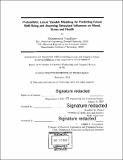Probabilistic latent variable modeling for predicting future well-being and assessing behavioral influences on mood, stress and health
Author(s)
Nosakhare, Ehimwenma
DownloadFull printable version (15.01Mb)
Other Contributors
Massachusetts Institute of Technology. Department of Electrical Engineering and Computer Science.
Advisor
Rosalind W. Picard.
Terms of use
Metadata
Show full item recordAbstract
In recent years, there has been a shift in the psychological research literature from an emphasis on dysfunction to a focus on well-being and positive mental health. As a result, enhancing well-being in individuals has become a viable approach to improving health, in addition to treating disorders when present. Also, the availability of rich multi-modal datasets and advances in machine learning methods have spurred an increase in research studies assessing well-being objectively. However, most of these studies tend to primarily focus on using data to estimate or detect the current state of well-being as opposed to the prediction of well-being. In addition, these studies investigate how stand-alone health behaviors and not a combination of health behaviors influence well-being. Furthermore, these studies do not provide data-backed insights and recommendations to individuals seeking to improve their well-being. In this dissertation, we use a real-world dataset from a population of college students and interpretable machine learning methods to (1) predict future mood, stress and health, (2) uncover how combinations of health behaviors work together to influence well-being, and (3) understand how to make evidence-based recommendations to individuals looking to improve their well-being. The use of these methods contributes to the development of objective techniques that can help individuals monitor their wellbeing. In addition, insights from this study contribute to knowledge advancement on how combinations of daily human behaviors can affect well-being.
Description
Thesis: Ph. D., Massachusetts Institute of Technology, Department of Electrical Engineering and Computer Science, 2018. Cataloged from PDF version of thesis. Includes bibliographical references (pages 111-118).
Date issued
2018Department
Massachusetts Institute of Technology. Department of Electrical Engineering and Computer SciencePublisher
Massachusetts Institute of Technology
Keywords
Electrical Engineering and Computer Science.